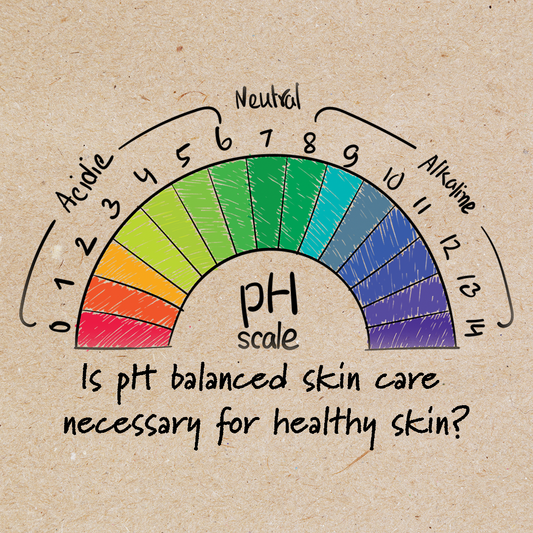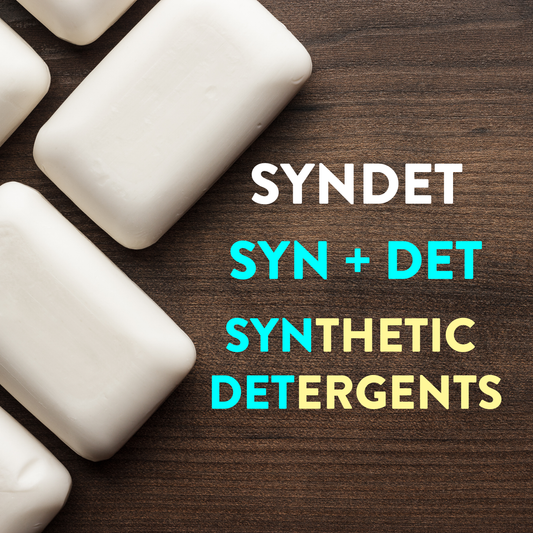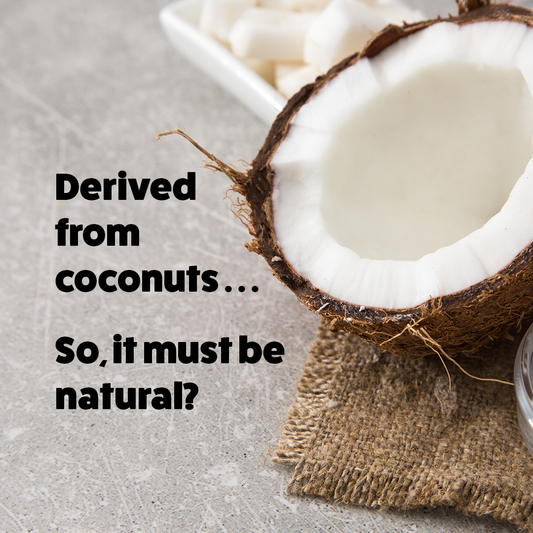The War on Natural Soap
A barrage of articles and blogs has launched a relentless attack on natural soap, warning of its supposedly detrimental effects on our skin. At the forefront of these criticisms is the issue of pH levels.
As a passionate advocate for natural soap, I'm stepping onto my soapbox once again to address the misconceptions and misinformation that fuel the ongoing "War on Natural Soap."
 I simply believe that natural soap has, and continues to receive unfair condemnation in the world of pH balanced skin care.
I simply believe that natural soap has, and continues to receive unfair condemnation in the world of pH balanced skin care.
A quick reminder: The typical pH scale ranges from 0 to 14. In general, any liquid with a pH less than 7 is considered acidic and a pH greater than 7 is considered alkaline or basic.
When people talk about the pH of the skin, they are referring to the pH of a very thin, slightly acidic, moist layer caused by normal secretions from sweat glands and sebaceous (oil) glands, dead skin cells, the breakdown of fatty acids by good bacteria that live on our skin and other skin secretions. This microenvironment, called the "Acid Mantle," sits on the surface of the top layer (the stratum corneum) of the epidermis of your skin.
I have spent many years researching the scientific literature about the anatomy, physiology, and biochemistry of skin.
I absolutely agree that the acid mantle not only provides the proper environment for the skin’s protective microbiome to flourish, but it is also responsible for a lot more including the proper functioning of the entire surface layer of our skin.
While I understand and respect the research that has been done over the years concerning skin pH, I disagree with the way in which the research is being commercially corrupted.
In order to truly understand the real "science" behind any question, researchers study small systems, small pieces of a larger puzzle, and then over time as more and more research is completed the puzzle pieces come together to create a better understanding of how systems work together.
What I object to is the way in which large companies take a small piece of research in its infancy stage and create a product marketing hype that plays on the fears of consumers in order to make millions.
This phenomenon is not unique to the soap industry. Some examples include . . .
- Our bodies need vitamins and minerals so let’s create a multibillion-dollar vitamin and supplement industry to replace a healthy balanced diet.
- Infants need proper nutrition so let’s create infant formula and persuade moms all over the world that it is the “perfect food for infants,” “better than breast milk.”
-
Butter is bad so let’s create a tub of hydrogenated margarine with trans fats that our bodies cannot metabolize properly.
- Bacteria is bad so let’s create antibacterial soaps and cleaning products to protect our families that not only create super-bacteria but totally disrupt the natural microbiome of everything.
-
Eggs are the best food, a complete protein. No wait, eggs have cholesterol which leads to cardiovascular disease. No wait, you can eat the whites but throw away the yolks! No, eating the whole egg can elevate HDL the good cholesterol. Today, eggs are considered nutritious and healthy rather than risky. But what about tomorrow?
-
Soap is bad so let’s create new products like “syndets” which are actually synthetic detergents that may be harmful to us and our environment, but they are supposedly pH balanced.
Each Person Is Unique
Each person’s acid mantle is dependent on the secretions our individual bodies put on the surface of our skin.
There are so many factors that affect the ecosystem that lives on our skin and each individual is quite unique.
Gender, age, ethnic origin, seasons, humidity, wind, pollution, dust, genetics, medication, what we eat and drink, even the fabrics we wear can all play a role.
If you shower, bathe, exfoliate, wear makeup, shave, exercise, even the way in which you use a towel can cause a temporary disruption in your acid mantle, your skin pH, and your microflora populations.
Do you enjoy relaxing in a warm bath?
The pH of a tap water bath can range from 7 to 8.5 depending on where you live.
 Tap water pH is affected by the composition of the groundwater bedrock, the presence of cleaning agents in the water, and the methods your municipal processing plants choose to treat the water.
Tap water pH is affected by the composition of the groundwater bedrock, the presence of cleaning agents in the water, and the methods your municipal processing plants choose to treat the water.
A study published in 2105, "The effects of water exposure on biophysical properties of normal skin," showed that simple water exposure increases skin pH, increases TEWL (transepidermal water loss), and has a disrupting effect on skin barrier function.
The true effect of tap water will vary depending on the health of the skin, the length of water exposure time, and the water temperature. Hard water with high mineral content may further affect the skin's pH. So, I guess we should not take baths!
Do you like to swim?
The pH of a typical pool is about 7.5. If you love the beach, the oceans have a pH of about 8.1. While the pH of freshwater lakes and rivers is naturally variable, the pH ranges from 6 to 9.
When you swim or bathe, your body is in contact with "non-pH-balanced" water for quite a while.
So, how can a pH-balanced cleanser that remains on your skin for seconds claim to be so important in the "protection" of your acid mantle?
There are so many factors that affect the pH and microbiome of the skin! Sorry, but the importance of pH-balanced synthetic cleansers, at the exclusion of all other ingredients, just does not make sense to me.
Studies have shown that the pH and microbial populations in different areas of the skin on one single human body can vary quite a bit. I am over 65 years old and over that period of time, my skin pH and microflora biome have changed dramatically.
So for whom are these cleansers pH balanced?
It should be obvious to everyone that anytime you clean the skin, even if your product is “pH balanced” you are removing and/or disrupting the natural microflora of the skin.
Learn More Blog: What is pH Balanced Skin Care?
Not All Soaps Are Created Equal
The main reason "soap" has received unfair condemnation is that although all soaps are not created equal, they are all lumped into one category called "soap." When researchers conduct studies comparing "soap" to pH-balanced syndet liquids or bars, they never mention which "soap" are they using?
Brief Chemistry of Soap
In order to understand why soaps are all different, you need to have a brief understanding of how real soap is made.
Saponification is the name for a chemical reaction between an acid and a base to form a salt called "soap." Sodium hydroxide is an alkali (base) and the acids are the fatty acids that make up the triglycerides present in oils and butters.

When the triglycerides in fats or oils react with the sodium hydroxide (dissolved in water), they are converted into soap and glycerin with a bit of water.
Notice there is no LYE, no sodium hydroxide on the product side (the right side) of the equation! No lye remains in our finished product!
So, What Is Different?
A quality, well-balanced natural soap bar requires an understanding of the chemistry of soapmaking. For every soap recipe, there is a precise amount fat (oils and butters) needed to ensure that all of the lye has been transformed into soap. If the right amount of oil is not used there will not be enough fatty acids available to combine with the NaOH. The result would be a very harsh soap with free lye (free alkali) left in the bar.
Mass manufactured bar soaps often have Free Alkali remaining in them. The free alkali increases the pH and makes the soaps harsh and drying. These companies also remove the natural moisturizing glycerin created during saponification. Glycerin is a humectant, meaning it attracts moisture to your skin. By removing the glycerin the soap is more drying on the skin.
Why do they so this? Free alkali increases shelf life, creates a harder bars, and also increases lathering properties. Removing glycerin also increases shelf life, creates a harder bar, and increases lather, but more importantly it can be added to lotions and creams which are much more profitable.
Also, saying a soap is "handmade" says nothing about the quality of the ingredients or the knowledge and skill of the soapmaker! I could easily create a very skin-drying soap using a high percentage of coconut oil. But in a balanced recipe coconut oil produces great lather. I could also create a "harsh" soap by formulating a bar using too much lye (sodium hydroxide).
Some handmade soapmakers use synthetic colors and fragrances.
At Chagrin Valley we superfat all of our soap and shampoo bars more than most natural soapmakers which again requires an understanding of chemistry.
Superfatting involves adding extra fat (plant oils and butters) beyond that which is needed to saponify all the lye which leaves a portion of unincorporated oils in the finished soap. This creates a mild soap with superior moisturizing and emollient qualities. These "extra oils" also provide free fatty acids which may help skin recover its natural pH balance faster.
I have read a lot of scientific research that begins with words like, "Using a harsh bar soap . . ." My question, what constitutes a "harsh" soap?
It troubles me that ALL soaps get lumped together in this commercial “war” against soap. Is this really a fair comparison?
Learn More Blog: The Chemistry of Soapmaking
What’s the best body wash?
Bar soap! But not just any bar soap.
 Look for natural, handmade, cold-process bar soap made with only natural and organic ingredients.
Look for natural, handmade, cold-process bar soap made with only natural and organic ingredients.
It is rich in natural glycerin, contains no synthetic detergents, and is wonderfully moisturizing to your skin.
Read the ingredients! Look for soaps that do NOT contain preservatives, synthetic colors or synthetic fragrance, all of which can irritate sensitive skin.
Learn More Blog: 12 Reasons to Use Natural Soap
Natural vs Synthetic Skin Care Ingredients
The pH-balanced skin care trend has led to a proliferation of synthetic ingredients claiming to be gentle and effective. However, we just don't know enough about the long-term effects of these synthetic chemicals on our skin or on our bodies.
There have been many studies, including one published in 2019 in Environment International, revealing that some synthetic chemicals in like phthalates show up in blood and urine tests, which means they are absorbed into the bloodstream. Phthalates are often used as fragrance solvents in personal care items.
According to this study, face and hand creams, anti-aging creams, body wash and shower gel, toothpaste, and shaving cream were the main personal care products that caused exposure to phthalates. You may never know if the product you are using contains phthalates. While they are required to be listed on product labels, if they are added as part of the proprietary scent blend they can be simply labeled as "fragrance" even if they make up a large portion of the product. Does your pH-balanced body wash have the word "fragrance" in the ingredient list?
Some synthetic chemicals, like sulfates, colorants, fragrances, and others can also cause contact dermatitis or other skin problems. Studies have shown that contact dermatitis increases the skin's pH and can become a chronic condition. So, how has the pH-balanced product helped that person?
Our skin is a resilient organ that withstands daily exposure to various environmental stressors. Is it possible that some synthetic chemicals in pH-balanced cleansing products can cause more damage to the skin than the temporary disruption of the acid mantle that comes from a well-formulated natural bar of soap?
I have noticed a number of websites like to create lists of the skin "problems" they believe are caused by soap, such as:
- sensitive skin
- rosacea
- breakouts
- chronic dry skin
- itchy, flaky skin
- irritated and inflamed skin
- cracked skin
But we have talked to and received reviews from so many customers who have found relief from the above problems after just a few days of using our handmade natural soap.

I do not believe that a correctly formulated bar of natural soap damages the acid mantle.
Does it temporarily disrupt the pH immediately after cleansing? Perhaps, but so does plain water.
The pH value alone does not determine whether a soap is gentle, harsh, or even effective.
The chemical makeup of a product consists of all of the important components, with the pH value being only one of them. Whether a product is gentle or damaging cannot be determined simply by low or high pH values.
These qualities are determined by the complete chemical makeup of the product. In other words, all of the ingredients used to create the skin or hair care product.
After all of my research and over 20 years of soap making, if I have a choice between Chagrin Valley's organic natural soap or a "pH balanced" synthetically manufactured "soap" with foaming cleansers, for me . . . there is no contest!
A well made bar of handcrafted soap is the best way to gently cleanse your skin of dirt, viruses and bacteria, and is a better choice for conscious consumers. At Chagrin Valley we know that natural bar soap is only as good as the ingredients used to make it.

Our Full Collection of Organic Soaps
What is pH Balanced Skin Care?
Are All Handmade Soaps The Same?
12 Reasons To Use Natural Soap


